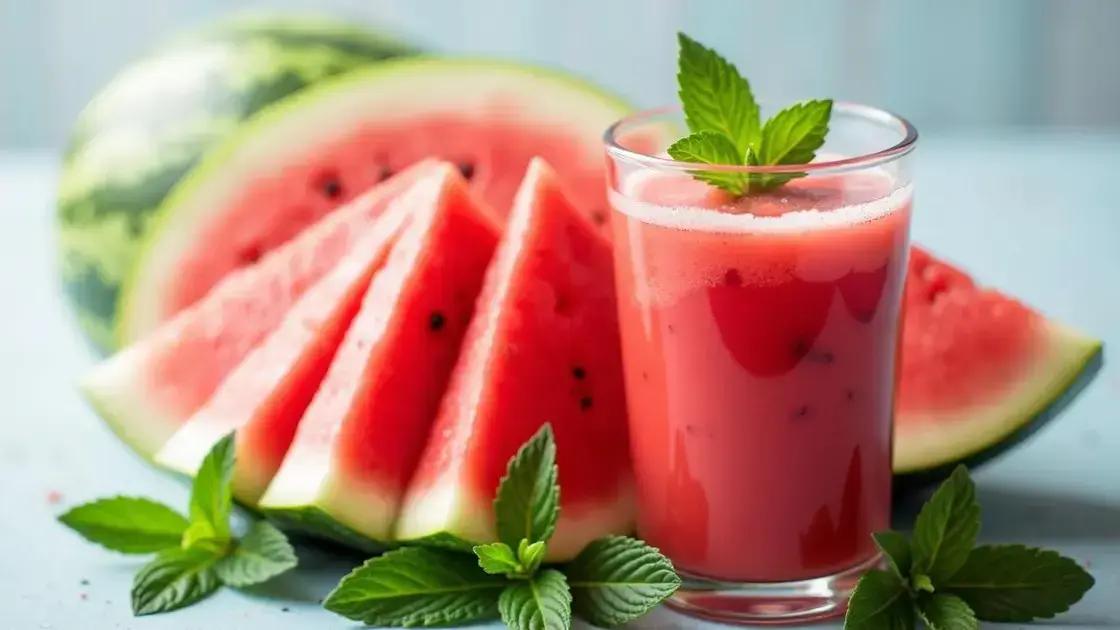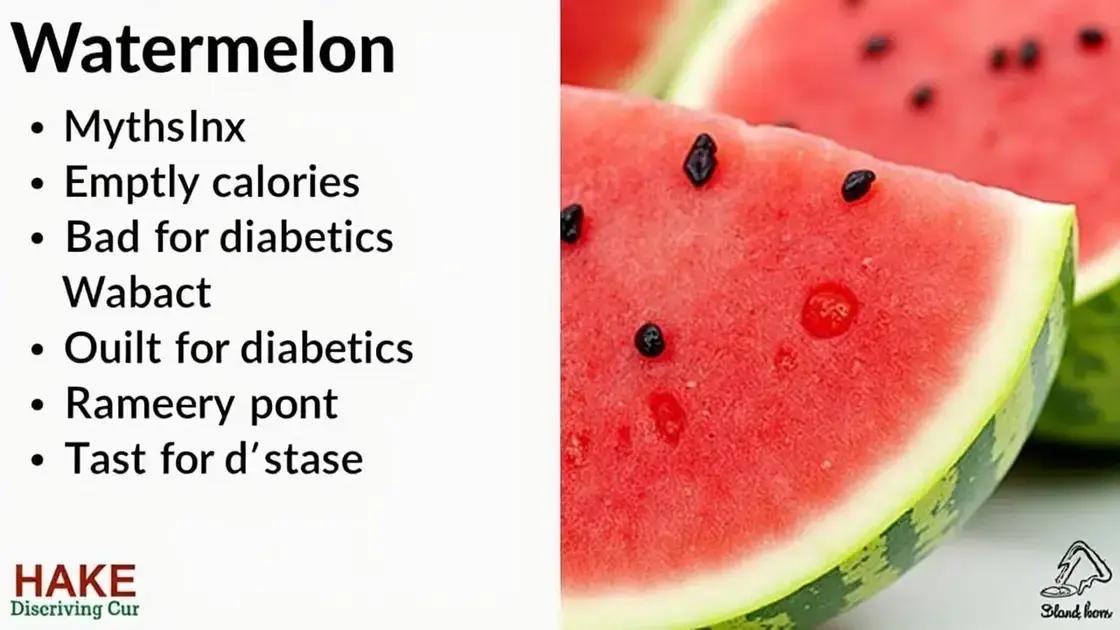Watermelon offers numerous health benefits, including hydration, vitamins A and C, and antioxidants like lycopene, making it a nutritious addition to your diet. It can be enjoyed in various culinary ways, such as salads, juices, and grilled dishes, while dispelling myths about its nutritional value for diabetics and evening consumption.
The watermelon trick is changing the way we view this beloved summer fruit. Recent research has unveiled intriguing health benefits that can enhance your diet. This delicious fruit, rich in vitamins and hydration, offers more than just a taste of summer. In this article, we dive into the fascinating health benefits of watermelon, explore new studies on its nutritional values, and uncover some innovative culinary uses. Let’s also debunk some common myths surrounding this juicy fruit!
The Fascinating Health Benefits of Watermelon

Watermelon is not just a delicious treat; it is packed with extraordinary health benefits. This summer fruit can support your overall health in many ways, making it a popular choice for nutritionists and health enthusiasts alike.
Rich in Nutrients
Watermelon is low in calories yet rich in vital nutrients. A single cup of watermelon provides vitamins A, C, and B6, along with potassium and magnesium. Vitamin A promotes healthy skin and vision, while Vitamin C boosts your immune system.
Hydration Power
One of the most fascinating benefits of watermelon is its high water content—about 92%. Staying hydrated is crucial, especially in hot weather. Eating watermelon can help replenish your fluids and maintain hydration levels.
Antioxidant Properties
Watermelon is also rich in antioxidants such as lycopene. This powerful antioxidant is known for its potential to reduce inflammation and lower the risk of chronic diseases, including heart disease and certain cancers. Studies suggest that lycopene may even enhance skin health by protecting it from harmful UV rays.
Muscle Recovery
After a workout, refreshing yourself with watermelon can aid in muscle recovery. The amino acid citrulline, found in watermelon, is believed to improve blood flow and reduce muscle soreness. This makes watermelon an excellent post-exercise snack.
Recent Studies on Watermelon in Nutrition

Recent studies on watermelon have highlighted its nutritional advantages and have solidified its place in a healthy diet. Researchers have focused on not only the traditional benefits but also the lesser-known aspects of this fruit.
Impact on Hydration
Studies show that the high water content in watermelon is effective for maintaining hydration. Researchers concluded that consuming watermelon can improve hydration levels better than some sports drinks, making it a natural choice for hydration.
Diabetes Management
Recent findings suggest that watermelon could also play a role in diabetes management. The fruit has a low glycemic index (GI), meaning it does not spike blood sugar levels quickly. This characteristic can be beneficial for individuals with diabetes, offering a sweet yet safe dessert option.
Nutritional Profile Enhancements
Another interesting study revealed that the nutritional profile of watermelon can be enhanced by pairing it with certain foods. When combined with nuts or yogurt, the absorption of the vitamins and minerals from watermelon improves, resulting in increased health benefits.
Cardiovascular Health
Research has also indicated that eating watermelon may benefit heart health. The lycopene present in watermelon has been linked to a reduced risk of heart disease. As a powerful antioxidant, it helps combat oxidative stress and inflammation.
Innovative Culinary Uses of Watermelon

Watermelon isn’t just for snacking; it can be transformed into innovative culinary creations that impress your guests and enhance your meals. Here are some exciting ways to use this versatile fruit in your kitchen.
Watermelon Salad
Mixing watermelon with fresh greens creates a refreshing salad. Adding ingredients like feta cheese, mint, and a drizzle of balsamic glaze makes it a unique dish. The sweetness of watermelon balances well with savory flavors.
Grilled Watermelon
Grilling watermelon is a game-changer. When grilled, the fruit’s natural sugars caramelize, bringing out intense flavor. Serve grilled watermelon as a side dish or a dessert topped with honey and a sprinkle of cinnamon.
Watermelon Juice and Cocktails
Watermelon juice is a thirst-quenching beverage perfect for summer. You can blend fresh watermelon and strain it to create a smooth drink. For something more adventurous, mix it into cocktails with vodka or rum for a fun, fruity twist.
Watermelon Rind Pickles
Don’t throw away the rind! You can pickle watermelon rind to create a crunchy, tangy snack. Simply boil the rind with vinegar, sugar, and spices for a delicious treat that adds a unique flavor profile to your meals.
Debunking Myths about Watermelon

There are many myths about watermelon that have spread over the years. Let’s take a closer look at these misconceptions and reveal the facts.
Myth 1: Watermelon is Just Empty Calories
Many people believe that watermelon offers no real nutrition. In reality, watermelon is low in calories but high in vitamins and minerals. It contains Vitamin C, Vitamin A, and several antioxidants, making it a healthy choice.
Myth 2: Eating Watermelon at Night Causes Digestive Problems
Another common myth is that eating watermelon at night will lead to gas or bloating. This is not true for most people. Watermelon is mostly water and easy to digest, so it can be enjoyed any time of day.
Myth 3: Watermelon is Bad for Diabetics
Some individuals think that watermelon should be avoided by those with diabetes due to its sugar content. On the contrary, watermelon has a low glycemic index, which means it can be safely included in a balanced diet for diabetic individuals when eaten in moderation.
Myth 4: Watermelon Can Only Be Eaten Fresh
People often believe watermelon is only good fresh, but there are many ways to enjoy it. Watermelon can be grilled, pickled, or even blended into smoothies. This versatility should not be overlooked!
Unveiling the Secrets of Watermelon
Throughout this article, we have explored the fascinating aspects of watermelon, from its numerous health benefits to the latest research studies showcasing its nutritional value.
We’ve also discovered innovative culinary uses for watermelon, allowing it to shine beyond basic snacks. Furthermore, debunking common myths surrounding this fruit has helped clarify its actual benefits versus misconceptions.
By understanding and embracing watermelon, you can incorporate this refreshing fruit into your diet in many enjoyable ways. So, next time you enjoy a slice of watermelon, remember all the valuable insights that make it not just a summer treat, but a powerhouse of nutrition.
FAQ – Frequently Asked Questions about Watermelon
What are the main health benefits of watermelon?
Watermelon is low in calories and rich in vitamins A and C, hydration, and antioxidants like lycopene, which can support heart health.
Can people with diabetes eat watermelon?
Yes, watermelon has a low glycemic index, making it suitable for moderation in a balanced diet for people with diabetes.
Is it true that eating watermelon at night causes digestive issues?
No, watermelon is easy to digest and can be eaten at any time without causing gas or bloating for most people.
What are some innovative ways to use watermelon in cooking?
You can use watermelon in salads, grill it, make smoothies, or pickled watermelon rind for unique dishes.
Are there any myths about watermelon that need to be debunked?
Yes, some myths include that it’s just empty calories and that it can only be eaten fresh, both of which are not true.
How can watermelon help with hydration?
Watermelon has a high water content, around 92%, which makes it an excellent choice for staying hydrated, especially in hot weather.













